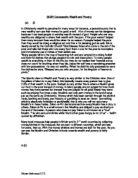Benjamin Franklin - A wealthy man with a rich character.
McMillin
Ann McMillin
Tuchinsky
History 021
19 September 2000
Benjamin Franklin: A Wealthy Man with a Rich Character
Benjamin Franklin was born into modest circumstances. With sixteen brothers and sisters, there was no room for selfishness. He learned early on the importance of putting others before himself and did not have excessively ambitious plans for the future. As a child, Franklin “...had a strong inclination for the Sea,” but his father would not hear of it. He ended up indentured to an older brother, who began his life as a printer. He was a hard worker but preferred to read books, conquer new subject matter, and engage in debates with other young scholars. His hard work did pay off in the financial sense later in life, but of more importance to him was the knowledge and enlightenment he received through his “hobbies.” He became well known for his work ethic, strong morals and giving persona throughout Philadelphia, throughout America, and eventually throughout western civilization. Although he ultimately acquired considerable wealth, Benjamin Franklin prioritized the betterment of his character, intellect and reputation over the betterment of his financial situation.
While still relatively young, Benjamin Franklin laid out guidelines on how to remain virtuous and content throughout his entire life. These guidelines contained thirteen virtues which he followed to the best of his ability. It was a “bold and arduous Project of arriving at moral Perfection (84).” In this guideline of virtues, Franklin lists Industry and Frugality. His definition of Frugality goes, “Make no Expence but to do good to others or yourself: i.e. Waste Nothing (85).” Following this virtue was beneficial to Franklin throughout his entire life. While still a printer, he was able to make a steady income by avoiding unnecessary pleasures, such as drinking and gambling, and unneeded material possessions. “We kept no idle Servants, our Table was plain and simple, our Furniture of the cheapest. For instance my Breakfast was a long time Bread & Milk, (no Tea), and I ate it out of a twopenny earthen Porringer with a Pewter Spoon (82),” Franklin writes. Another virtue, Industry, goes, “Lose no Time. – Be always employed in something useful. – Cut off all unnecessary Actions,” explaining his strong work ethic. Although both Industry and Frugality are both ways of sensibly saving money, they are not necessarily a strategy for becoming wealthy. Also, they are only two components in a long list of virtues, showing that money plays a small part in Franklin’s big picture. Others include Temperance, Silence, Order, Resolution, Sincerity, Justice, Moderation, Cleanliness, Tranquility, Chastity, and Humility (85). Franklin diligently practiced all these virtues as well, contributing to his good character. In an essay entitled Busy Body, Franklin states, “Virtue alone is sufficient to make a Man Great, Glorious and Happy (223).”







